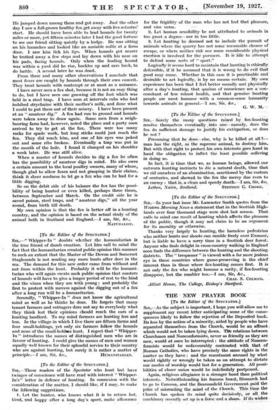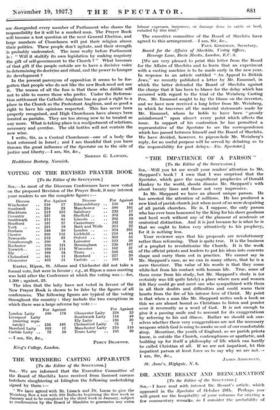- THE - NEW PRAYER BOOK [To the Editor of the
SPECTATOR.] Sia,—As the subject is important, I hopc.you will allow me to supplement my recent letter anticipating some of the conse- quences likely to follow the rejection of the Deposited book. Its loss by the action of-a minority, aided by people who have
separated themselves from the Church, would be an affront , which would not be taken lying down. The relations between Churchmen and Nonconformists, never so friendly as they are now, would at once be interrupted : the attitude of Noncon- formists would be unfavourably contrasted with that of Roman Catholics, who have precisely the same rights in the matter as they have : and the resentment aroused by what would rightly or wrongly be taken as an attempt to dictate our modes of worship would last for a- generation. All possi- bilities of closer union would be indefinitely postponed.
Again, religious allegiance is a stronger bond than political interests. Notwithstanding his famous boast, Bismarck had to go to Canossa, and the Beaconsfield Government paid the price of misreading the mind 9f the Church. This time the Church has spoken its mind quite decisively, or all the machinery recently set up is a farce and a sham. If its wishes
are disregarded every member of Parliament who shares the responsibility for it will be a marked man. The Prayer Book will become a test question at the next General Election, and large numbers of Churchmen will put their religion above their politics. These people don't agitate, and their strength is probably underrated. The issue really before Parliament is : " Will it stultify its own legislation by making nugatory the gift of self-government to the Church ? " What becomes of that gift if the people outside are to have a decisive voice in determining its doctrine and ritual, and the power to hamper its development ?
In the present paroxysm of opposition it seems to be for- gotten. that people who do not like the new Book need not use it. The reason of all the fuss is that those who dislike will not to able to coerce those who prefer. Under the Reforma- tion settlement the Catholic Anglican has as good a right to a place in the Church as the Protestant Anglican, and as good a right to have his opinions respected. This has never been properly recognized, and High Churchmen have always been treated as pariahs. They are too strong now to be treated so any more. What is taking plaee is'a readjustment of relations, necessary and overdue. The old bottles will not contain the new wine.
I write, Sir, as a Central Churchman—one of a body the least esteemed in Israel ; and I am thankful that you have thrown the great influence of the Spectator on to the side of justice and liberty.—I am, Sir, &C.,
Haddiscoe Rectory, Norwich.
NORTON G. LAWSON.















































 Previous page
Previous page